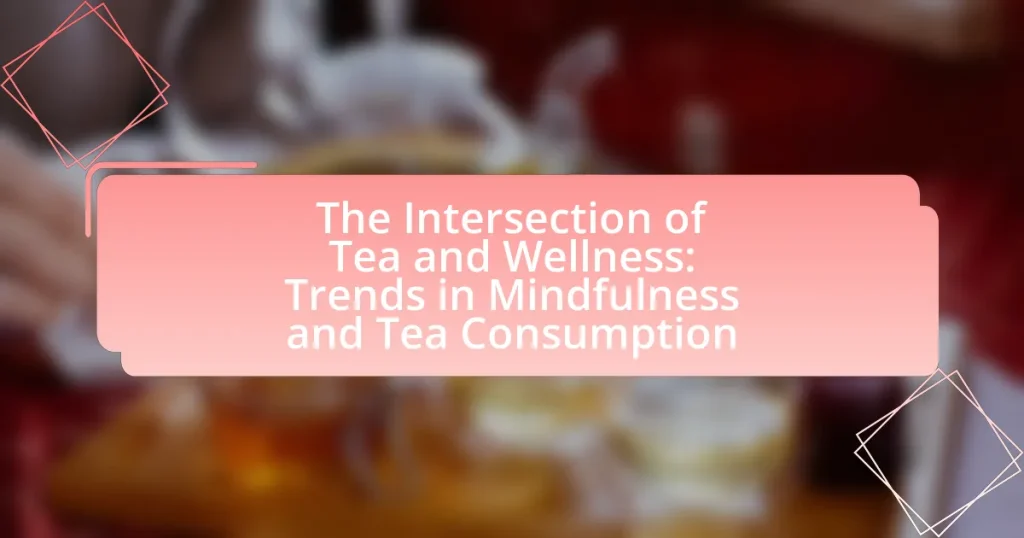The article explores the relationship between tea and wellness, highlighting the health benefits associated with tea consumption, including improved cardiovascular health, mental clarity, and stress reduction. It discusses how tea enhances mindfulness practices through its ritualistic preparation and consumption, promoting relaxation and focus. Various types of tea, such as green, chamomile, and herbal teas, are examined for their specific wellness benefits, while emerging trends in tea consumption related to wellness, including the rise of herbal and specialty teas, are also addressed. Additionally, the article provides practical tips for enhancing the tea-drinking experience and integrating tea into wellness routines, emphasizing the importance of quality and mindful practices.

What is the relationship between tea and wellness?
Tea is closely linked to wellness due to its rich composition of antioxidants, vitamins, and minerals that contribute to various health benefits. Research indicates that tea consumption can enhance mental clarity, reduce stress, and improve cardiovascular health. For instance, a study published in the Journal of Nutrition found that regular tea drinkers had a lower risk of heart disease, attributed to the flavonoids present in tea that promote heart health. Additionally, herbal teas, such as chamomile and peppermint, are known for their calming effects, which can aid in relaxation and improve sleep quality. Thus, the relationship between tea and wellness is supported by both its nutritional properties and its role in promoting mental and physical health.
How does tea consumption influence mindfulness practices?
Tea consumption enhances mindfulness practices by promoting relaxation and focus. The act of preparing and drinking tea encourages individuals to slow down, engage their senses, and be present in the moment. Research indicates that the ritualistic nature of tea drinking can lead to reduced stress levels and increased awareness, which are essential components of mindfulness. For instance, a study published in the Journal of Psychosomatic Research found that participants who engaged in mindful tea drinking reported lower anxiety and improved emotional regulation. This connection between tea consumption and mindfulness is further supported by the calming effects of certain tea varieties, such as chamomile and green tea, which contain compounds that can enhance mental clarity and relaxation.
What types of tea are most associated with mindfulness benefits?
Green tea, chamomile tea, and herbal teas are most associated with mindfulness benefits. Green tea contains L-theanine, an amino acid that promotes relaxation and reduces stress, enhancing focus during mindfulness practices. Chamomile tea is known for its calming effects, which can help ease anxiety and improve sleep quality, further supporting mindfulness. Herbal teas, such as peppermint and lavender, also contribute to relaxation and mental clarity, making them beneficial for mindfulness activities. These teas have been studied for their effects on mental well-being, reinforcing their association with mindfulness practices.
How does the ritual of tea preparation enhance mindfulness?
The ritual of tea preparation enhances mindfulness by encouraging focused attention on the present moment. Engaging in the step-by-step process of measuring, boiling, and steeping tea allows individuals to immerse themselves in sensory experiences, such as the aroma and color of the tea. Research indicates that such mindful practices can reduce stress and improve emotional well-being, as demonstrated in a study published in the Journal of Positive Psychology, which found that mindfulness activities, including tea preparation, significantly enhance overall mental health.
Why is tea considered a wellness beverage?
Tea is considered a wellness beverage due to its rich content of antioxidants and various health-promoting compounds. These components, such as polyphenols and flavonoids, have been shown to reduce inflammation, improve heart health, and enhance mental clarity. Research published in the Journal of Nutrition indicates that regular tea consumption is associated with a lower risk of chronic diseases, including cardiovascular disease and certain cancers. Additionally, the calming effects of tea, particularly herbal varieties like chamomile and lavender, contribute to stress reduction and improved mental well-being, aligning with current trends in mindfulness practices.
What health benefits are linked to regular tea consumption?
Regular tea consumption is linked to several health benefits, including improved heart health, enhanced mental alertness, and reduced risk of certain chronic diseases. Studies have shown that the antioxidants in tea, particularly flavonoids, can lower blood pressure and improve cholesterol levels, contributing to cardiovascular health. Additionally, caffeine and L-theanine in tea can enhance cognitive function and focus. Research published in the Journal of Nutrition indicates that regular tea drinkers have a lower risk of developing type 2 diabetes and certain cancers, further supporting the health benefits associated with tea consumption.
How do different tea varieties contribute to overall wellness?
Different tea varieties contribute to overall wellness through their unique health benefits, which include antioxidant properties, anti-inflammatory effects, and mental clarity enhancement. For instance, green tea is rich in catechins, which are antioxidants that can improve heart health and support weight management. Black tea contains flavonoids that may lower blood pressure and improve gut health. Herbal teas, such as chamomile, are known for their calming effects, promoting better sleep and reducing anxiety. Research published in the Journal of Nutritional Biochemistry indicates that regular consumption of tea can lead to improved cognitive function and reduced risk of chronic diseases, reinforcing the positive impact of various tea types on overall wellness.

What trends are emerging in tea consumption related to wellness?
Emerging trends in tea consumption related to wellness include a growing preference for herbal and functional teas that promote health benefits, such as stress relief, improved digestion, and enhanced immunity. Consumers increasingly seek teas infused with adaptogens, antioxidants, and other natural ingredients that support mental and physical well-being. For instance, a report by the Tea Association of the USA indicates that herbal tea sales have surged, reflecting a shift towards beverages perceived as health-enhancing. Additionally, the rise of mindfulness practices has led to an increase in tea rituals, where consumers engage in intentional tea preparation and consumption as a form of self-care and relaxation.
How are consumers integrating tea into their wellness routines?
Consumers are integrating tea into their wellness routines by using it as a natural remedy for stress relief and improved mental clarity. Research indicates that specific teas, such as green tea and chamomile, contain compounds that promote relaxation and cognitive function. For instance, a study published in the Journal of Nutritional Biochemistry found that the amino acid L-theanine, prevalent in green tea, can enhance relaxation without causing drowsiness. Additionally, many consumers are incorporating tea rituals into their daily practices, such as mindful tea drinking, which fosters a sense of calm and presence. This trend aligns with the growing focus on mindfulness in wellness, where the act of preparing and consuming tea becomes a meditative experience, further enhancing its benefits.
What role does social media play in promoting tea and wellness trends?
Social media plays a crucial role in promoting tea and wellness trends by facilitating the rapid dissemination of information and fostering community engagement around these topics. Platforms like Instagram and TikTok enable users to share visually appealing content, such as tea recipes, health benefits, and mindfulness practices, which can influence consumer behavior and preferences. For instance, a study published in the Journal of Consumer Research found that social media influencers significantly impact followers’ purchasing decisions, particularly in health-related products like herbal teas. This demonstrates that social media not only raises awareness but also drives the popularity of tea as a wellness choice among consumers.
How are wellness brands incorporating tea into their product lines?
Wellness brands are incorporating tea into their product lines by developing functional blends that target specific health benefits, such as stress relief, digestion, and immunity support. For instance, brands like Yogi Tea and Traditional Medicinals create herbal teas infused with adaptogens and botanicals known for their therapeutic properties, aligning with consumer demand for holistic health solutions. Additionally, many wellness brands are introducing ready-to-drink tea beverages that combine tea with superfoods, vitamins, and minerals, catering to the growing trend of convenient health products. This integration is supported by market research indicating that the global herbal tea market is projected to reach $3.5 billion by 2027, reflecting the increasing consumer interest in wellness-oriented tea options.
Why is there a growing interest in herbal and specialty teas?
There is a growing interest in herbal and specialty teas primarily due to their perceived health benefits and alignment with wellness trends. Consumers increasingly seek natural remedies and holistic approaches to health, leading to a rise in the popularity of herbal teas known for their therapeutic properties, such as chamomile for relaxation and ginger for digestion. Additionally, specialty teas often offer unique flavors and experiences, appealing to a more discerning audience. According to a report by Grand View Research, the global herbal tea market is expected to reach $3.5 billion by 2027, reflecting a significant shift towards these beverages as part of a healthier lifestyle.
What are the most popular herbal teas for wellness today?
The most popular herbal teas for wellness today include chamomile, peppermint, ginger, and hibiscus. Chamomile is widely recognized for its calming effects and ability to promote sleep, supported by studies indicating its efficacy in reducing insomnia symptoms. Peppermint tea is favored for its digestive benefits, with research showing it can alleviate symptoms of irritable bowel syndrome. Ginger tea is known for its anti-inflammatory properties, which are backed by evidence highlighting its role in reducing nausea and muscle pain. Hibiscus tea is celebrated for its potential to lower blood pressure, as demonstrated in clinical trials that confirm its effectiveness in managing hypertension.
How do specialty teas differ from traditional teas in wellness applications?
Specialty teas differ from traditional teas in wellness applications primarily through their targeted health benefits and unique ingredient compositions. While traditional teas, such as black, green, and oolong, generally provide broad health benefits like antioxidant properties and hydration, specialty teas often incorporate specific herbs, botanicals, and functional ingredients aimed at addressing particular wellness needs, such as stress relief, digestion, or immune support. For instance, a specialty tea blend might include adaptogens like ashwagandha for stress management, whereas traditional teas focus on general health benefits. This distinction is supported by research indicating that specific herbal combinations can enhance therapeutic effects, making specialty teas a more tailored option for wellness applications.

How can individuals enhance their wellness through tea consumption?
Individuals can enhance their wellness through tea consumption by incorporating various types of tea known for their health benefits into their daily routines. For instance, green tea is rich in antioxidants, particularly catechins, which have been shown to improve heart health and aid in weight management. Research published in the Journal of Nutrition indicates that regular consumption of green tea can lead to a significant reduction in body fat and improved metabolic rates.
Additionally, herbal teas such as chamomile and peppermint can promote relaxation and improve sleep quality, contributing to overall mental wellness. A study in the journal Sleep Medicine Reviews found that chamomile tea can reduce insomnia symptoms, thereby enhancing sleep quality.
Furthermore, black tea has been linked to improved gut health due to its polyphenol content, which supports beneficial gut bacteria. A review in the journal Nutrients highlights that black tea consumption can positively influence gut microbiota, leading to better digestive health.
In summary, individuals can enhance their wellness through tea consumption by selecting specific teas that offer targeted health benefits, supported by scientific research demonstrating their efficacy.
What practical tips can improve the tea-drinking experience for wellness?
To improve the tea-drinking experience for wellness, focus on selecting high-quality loose-leaf teas, as they often contain more antioxidants and beneficial compounds than tea bags. Brewing tea at the correct temperature and for the appropriate duration enhances flavor and maximizes health benefits; for example, green tea should be brewed at around 175°F for 2-3 minutes to preserve its catechins. Incorporating mindfulness practices, such as savoring each sip and engaging the senses, can enhance relaxation and promote mental well-being. Additionally, pairing tea with healthy snacks, like nuts or fruits, can provide complementary nutrients that support overall wellness. Studies indicate that regular tea consumption is associated with lower risks of chronic diseases, reinforcing the health benefits of mindful tea-drinking practices.
How can one create a mindful tea ritual at home?
To create a mindful tea ritual at home, one should focus on the intentional preparation and consumption of tea, emphasizing presence and sensory engagement. Begin by selecting high-quality loose-leaf tea, as its aroma and flavor enhance the experience. Prepare the tea in a quiet space, free from distractions, allowing time to appreciate the process of boiling water, steeping the leaves, and observing the color change. Engage the senses by inhaling the aroma, feeling the warmth of the cup, and savoring each sip slowly, which promotes mindfulness. Research indicates that such rituals can reduce stress and enhance well-being, aligning with trends in mindfulness practices that emphasize sensory awareness and present-moment focus.
What are the best practices for selecting quality teas for health benefits?
To select quality teas for health benefits, prioritize whole leaf teas over tea bags, as whole leaves retain more essential oils and nutrients. Whole leaf teas, such as loose green or black teas, typically contain higher levels of antioxidants, which are beneficial for health. Additionally, consider the origin of the tea; regions known for high-quality production, like Darjeeling in India or Uji in Japan, often yield superior teas. Look for organic certifications to avoid pesticides and chemicals, ensuring a cleaner product. Finally, check for freshness; tea should be consumed within a year of harvest for optimal flavor and health benefits.
What common mistakes should be avoided in tea consumption for wellness?
Common mistakes to avoid in tea consumption for wellness include overconsumption of caffeine, neglecting proper steeping times, and using low-quality tea leaves. Overconsumption of caffeine can lead to increased anxiety and disrupted sleep patterns, as studies show that excessive caffeine intake can elevate cortisol levels. Neglecting proper steeping times can result in bitter flavors and reduced health benefits; for instance, green tea should typically steep for 2-3 minutes to preserve its antioxidants. Lastly, using low-quality tea leaves diminishes the potential health benefits, as higher-quality teas contain more beneficial compounds like catechins and polyphenols, which are linked to improved health outcomes.
How can overconsumption of tea negatively impact health?
Overconsumption of tea can negatively impact health by leading to increased caffeine intake, which may cause insomnia, anxiety, and digestive issues. High levels of caffeine can disrupt sleep patterns, contributing to insomnia, while excessive consumption can heighten anxiety levels due to its stimulant effects. Additionally, overconsumption may result in gastrointestinal discomfort, as certain compounds in tea can irritate the stomach lining. Studies indicate that consuming more than 4-5 cups of tea daily can elevate these risks, particularly in sensitive individuals.
What should one consider when combining tea with other wellness practices?
When combining tea with other wellness practices, one should consider the specific health benefits of the tea being consumed, as different types of tea offer various properties that can enhance or complement wellness routines. For example, green tea is rich in antioxidants and may support metabolism, while chamomile tea is known for its calming effects, which can aid in relaxation practices such as meditation. Additionally, it is important to assess potential interactions between the tea and other wellness practices, such as herbal supplements or dietary restrictions, to avoid adverse effects. Research indicates that the polyphenols in tea can interact positively with mindfulness practices by promoting mental clarity and reducing stress, thereby enhancing overall wellness outcomes.


